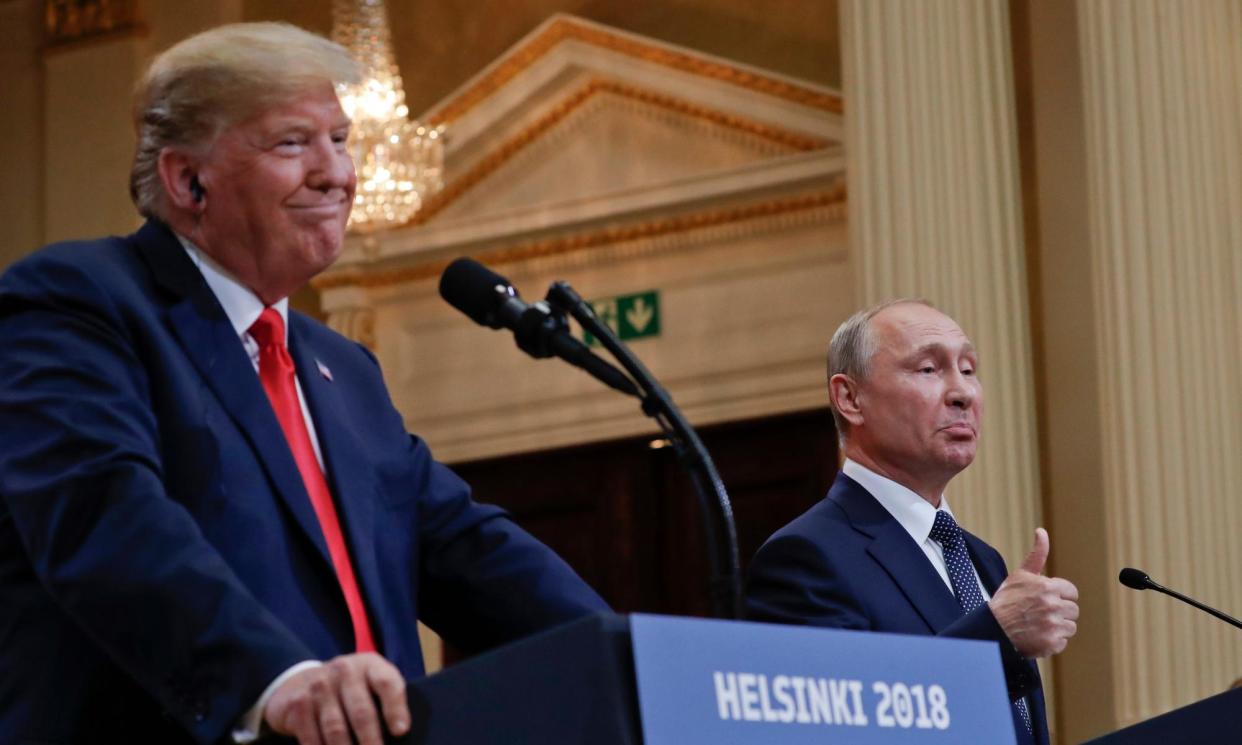Trump thought Ukraine ‘must be part of Russia’ during presidency, book says

As president, Donald Trump “made it very clear” that he thought Ukraine “must be part of Russia”, his former adviser Fiona Hill says in a new book about US national security under threat from Russia and China.
Related: Putin bromance has US intelligence officials fearing second Trump term
“Trump made it very clear that he thought, you know, that Ukraine, and certainly Crimea, must be part of Russia,” Hill, senior director for European and Russian affairs on the US National Security Council between 2017 and 2019, tells David Sanger, a New York Times reporter and author of New Cold Wars: China’s Rise, Russia’s Invasion, and America’s Struggle to Defend the West.
“He really could not get his head around the idea that Ukraine was an independent state.”
This, Sanger writes, meant Trump’s view of Ukraine was “essentially identical” to that of Vladimir Putin, the Russian president who would order an invasion of Ukraine in February 2022, a year after Trump left office.
Before triggering the invasion, Putin said in a speech: “Ukraine is an inalienable part of our own history, culture and spiritual space.”
Last month, in a speech marking 10 years since the annexation of Crimea, Putin declared that parts of occupied Ukraine were part of a “New Russia”.
New Cold Wars will be published in the US on Tuesday. The Guardian obtained a copy.
The book appears with the Ukraine war grinding into its third year but with $60bn of new US military aid to Kyiv blocked by far-right Republicans in the US House, acting in accordance with Trump’s wishes as he runs to defeat Joe Biden in a presidential election rematch and return to power.
The House speaker, Mike Johnson, has indicated he wants to pass Ukraine aid but he faces strong opposition, not least from Trump, with whom Johnson is due to appear in Florida on Friday. Biden has strongly condemned Republicans’ hold on Ukraine aid, as have lawmakers from both parties. Biden and other senior figures have also condemned Trump’s words in support of Putin, including a stunning promise to “encourage Russia to do what the hell they want” to US Nato allies he deems financially delinquent.
Related: ‘Trump thought I was a secretary’: Fiona Hill on the president, Putin and populism
On Thursday, Alexander Vindman, formerly the top Ukraine aide on Trump’s national security council, told CNN that without new US aid, Ukraine’s position had become “quite precarious”.
Like Hill, Vindman was a key witness in Trump’s first impeachment trial, over his attempts to blackmail Ukraine by withholding military support, in an attempt to extract political dirt on rivals including Biden.
Vindman was fired, after Senate Republicans loyal to Trump assured his acquittal at trial. Hill left office on her own terms.
Vindman was born in Ukraine. Hill was born in Britain. Now a fellow at the Brookings Institution in Washington DC and chancellor of Durham University in the UK, Hill’s thoughts on Trump, Russia and Putin remain eagerly sought, particularly given her co-authorship of Mr Putin: Operative in the Kremlin, a well-regarded biography.
In Washington in February, Hill told a conference staged by anti-Trump conservatives that Trump “idolises” Putin for his autocratic leadership and longevity in power.
That view, Hill said, contributed to Trump’s furious rejection of intelligence agencies’ conclusion that Russia intervened in the 2016 election to help Trump win.
She also said she had spoken to European leaders at the Munich security conference, finding them nervously preparing for a possible second Trump administration.
Related: Trump may not be in power, but his Ukraine rhetoric has spooked Europe
“The prime ministers and presidents and foreign ministers and others … all know how capricious Trump is,” Hill said. “And that’s really what they’re worried about, because it doesn’t matter how many people that they know who become secretary of state or secretary of defense, it comes down to Trump himself and the unpredictability of his personality.”
Hill’s words to Sanger about Trump’s view of Ukraine, though brief, seem guaranteed only to add to such worries.
The result of growing qualms about Trump, his attitude to Russia and other idiosyncrasies, Hill said in February, “is that [European leaders] have started to lose faith in the United States. And it’s very distressing to hear.”


